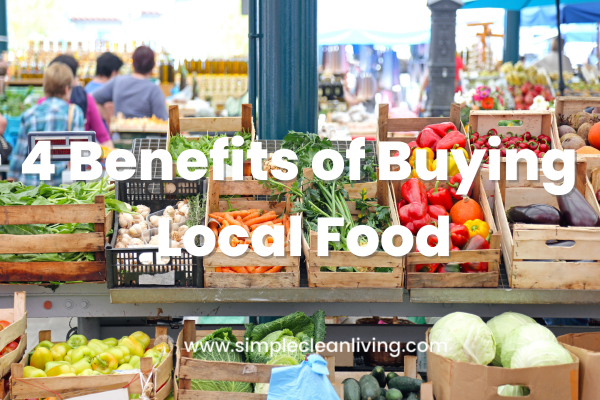Notice: I’m an affiliate for Amazon as well as other companies. Any links in this article may be affiliate links. I always appreciate it if you purchase something using my affiliate links. Doing so helps me to raise a little extra money that pays for the costs of running this site. And it allows me to continue bringing you quality content, all without costing you a thing! Thanks!
How often do you buy local food? As an energy-sensitive person, fresh, locally grown produce, meat, dairy, and eggs can be beneficial for your energetic health.
For empaths, it is important to include as much energy and nutrient-rich whole foods as possible. The energy of food does have an impact on us. And what we eat is one important way we can better manage our own energy! Since I started my own whole food/real food lifestyle, I have made a lot of changes in how I eat. I’m a little embarrassed to think back on how long I relied on frozen dinners and takeout food. Of course, now understanding the energetic needs of my body has changed all that!
I’ve incorporated more fresh fruits and veggies into my diet. And now I am cooking home-cooked meals instead of fast food and highly processed foods.
dairy, and meat from local farmers from animals that are pasture-raised.
Why it is good to buy local for your food needs:
Sustainability!
What is sustainable food? This type of food is produced in a manner that is healthy for the body, environmentally friendly, kind to animals, and fair to workers. Sustainable foods typically come from smaller farms and ranches (although there are some wonderful larger companies that promote sustainable practices). These farms and ranches do not use pesticides, hormones, steroids, or antibiotics. Since chemical sensitivities can be a concern when you are energy sensitive, avoiding these things is important! The best place to find sustainable foods is at your local farmer’s market. Be sure to ask the different vendors about their farming practices, as there are some small farms that do use pesticides on their crops! Be an informed consumer.
Food is fresher and tastes better!
Most supermarket foods have spent days, even weeks in transit to your local supermarket produce department. Many of the most popular fruits and vegetables are imported from countries around the world. When produce is in transit for a long time, it loses vital nutrients as compared to local sustainable foods that come to your kitchen in much less time.
Benefits the local economy
When you support local farmers, you are putting money into your local economy, which allows the farmers to continue to provide high-quality produce, dairy, and meat for all to enjoy!
Reduces dependency on foreign oil
Local goods have to travel a far shorter distance than goods shipped in from overseas. A very large portion of the fuel consumed in the US is done because of shipping. When we buy local, then large corporations will not need to ship as much. The more people begin purchasing local, the less dependent we are on foreign oil. Also, major corporations with large farming operations use far more energy than smaller, sustainable farms. Our overall energy usage will be reduced, as will our carbon footprint.
Many people use the excuse that sustainable food is more expensive. Yes, it is a little more expensive. But, by consuming healthier foods that are free from pesticides, antibiotics, steroids, and hormones, you will notice that your health will begin to improve and it will reduce your medical expenses in the long run. So, spend a little more now to improve the quality of your food and you won’t have to pay the doctor later!
Where to find sustainably grown food
Your local farmer’s market, directly from the farms, or small, locally-owned stores are your first line of defense. Be sure to ask the farmers about their farming practice. Those that are sustainable will be more than happy to share that information with you. They tend to be very passionate about farming sustainably! Your next option is health food stores such as Whole Foods and Earth Fare which often carry a variety of produce, meat, and dairy products from local sustainable farmers. The last option is your local supermarket. Supermarkets are now carrying more and more organic options. Organic farmers, use sustainable practices.
If you want to find local resources for nourishing, whole foods, please contact your local Weston A Price chapter leader. They have resources for local pasture-raised meat, dairy, and produce.




